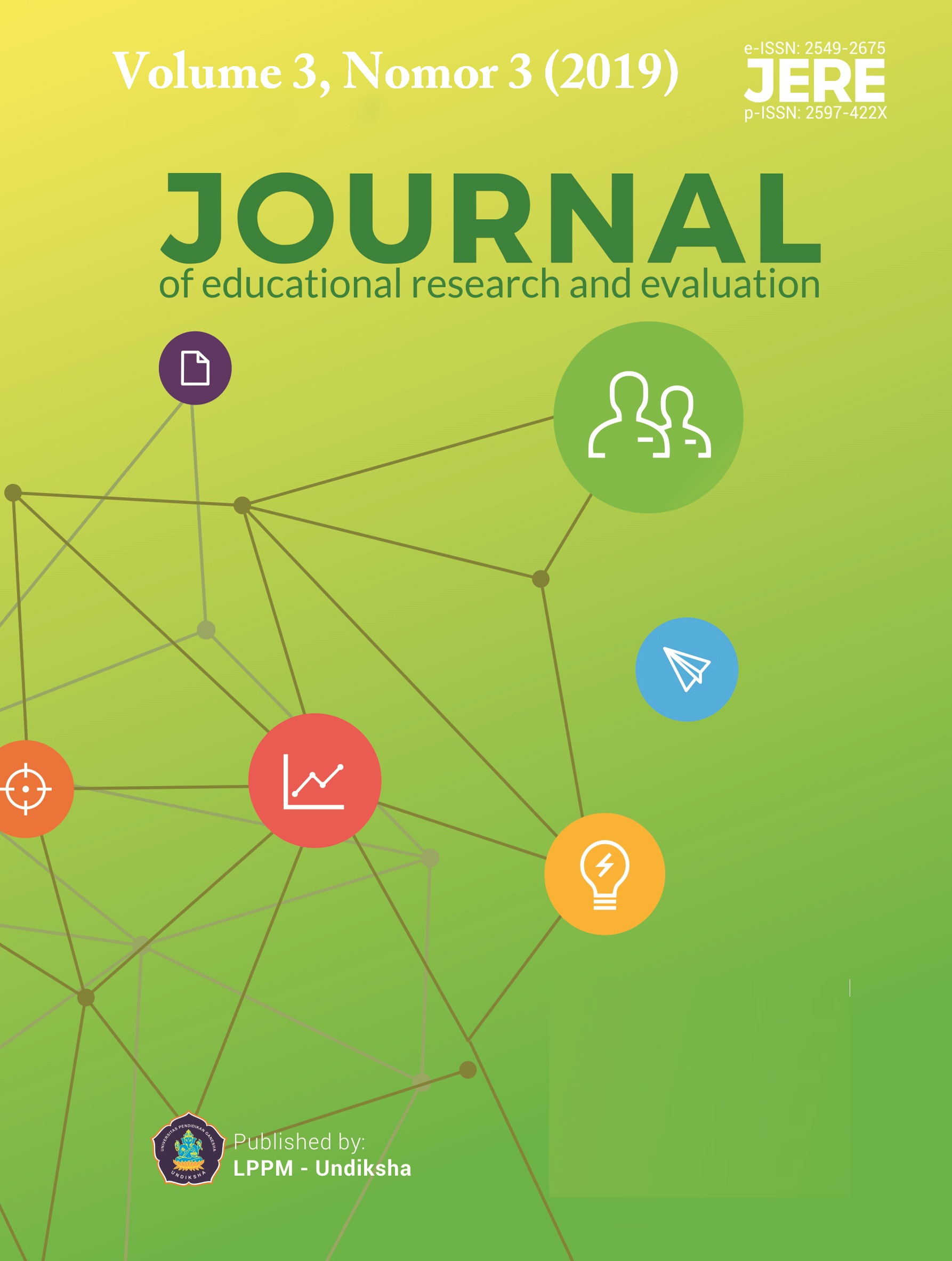The Effect of Project Based Learning and Learner Autonomy on Students’ Speaking Skills
DOI:
https://doi.org/10.23887/jere.v3i3.21855Keywords:
Learner Autonomy, Project-based Learning, Speaking SkillsAbstract
This study was aimed at investigating the effect of project-based learning on students’ speaking skills at the eighth grade students of SMPN 5 Kuta Selatan in academic year 2018/2019. The design of the study was post-test only control group with 2x2 factorial designs. Sample involved 82 students that were selected through random sampling technique. The data were collected through questionnaire of learner autonomy and speaking performance test which had been validated before. The data were analysed by using two way ANOVA and t-Scheffe. The study discovered: there was different effect in speaking skills between the students who were taught by using project-based learning and those who were taught by using conventional method (F=18.391 and p<0.05) in which the Project-Based Learning group excelled better in speaking skills, there was an interaction between learner autonomy and project-based learning in affecting students’ speaking skills (F= 45.325 and p<0.05), the students in which high learner autonomy who were taught by using the project-based learning affect better than those who were taught by using conventional method; however, there was not significantly different in speaking skills of the students with low learner autonomy who were taught by using project-based learning and who were taught by using conventional method (p>0.05).
References
Ahmadzadeh, R. (2014). Learner autonomy in practice, (October), 49–57. Retrieved from http://www.ijonte.org/FileUpload/ks63207/File/05.ahmadzadeh.pdf
Artini, L.P (2017). Project Based Learning Activities and EFL Students' Productive Skills in English. Ganesha University. DIO: http://dx.doi.org/10.17507/jltr.0806.16 Retrieved from http://www.academypublication.com/ojs/index.php/jltr/article/view/jltr080611471155/1282
Bell, S. (2010). Project-Based Learning for the 21st Century: Skills for the Future. Routledge: Taylor&Francis Group. DOI: 10.1080/00098650903505415. Retrieved from https://www.academia.edu/34971404/
Brown, H. D. (2004). Language Assessment: Principles and Classroom Practices. New York Pearson Education Inc.
Chiang, C. L., & Lee, H. (2016). The Effect of Project-Based Learning on Learning Motivation and Problem-Solving Ability of Vocational High School Students, 6(9). Retrieved from https://doi.org/10.7763/IJIET.2016.V6.779
Clark H., M., & Clark. E., V. (1977). Psychology and Language: An Introduction to Psycholinguistics. New York: Harcout Brace Jovanovich.
Cohen,L., Manion, L., Morrison, K. (2007) Research Method in Education. Sixth Edition. Routledge: Taylor & Francis e-Library
Heriansyah, H. (2012). Speaking Problems Faced by the English Departement Students of Syiah Kuala University. Aceh: Syiah Kuala University.
Ismuwardani, Z., Nuryatin, A., Doyin. (2018). Implementation of Project Based Learning Model to Increased Creativity and Self-Reliance of Students on Poetry Writing Skills. Retrieved from https://doi.org/10.15294/ipe.v8i1.25229
Jamila, M. (2013). Use of Learner Autonomy in Teaching Speaking by Tertiary Level English Language Teachers in Private Universities of Bangladesh, 18(4), 29–43. Retrieved from https://pdfs.semanticscholar.org/8b88/18e647e8b53419243b9412ff079389f2a199.pdf
Larmer, J., Mergendoller, J., Boss, S. (2015). Setting the Standard for Project Based Learning. Buck Institute for Education: USA
Little, D. (1995). Learning As Dialogue : The Dependence Of Learner Autonomy On Teacher Autonomy. Retrieved from https://www.sciencedirect.com/science/article/pii/0346251X95000066
Myartawan, I. P. N. W. (2015). The Correlation Between Learner Autonomy And English Proficiency Of Indonesian Efl College Learners The Correlation Between Learner Autonomy And English Proficiency Of Indonesian Efl College Learners (September). Retrieved from http://www.journal.teflin.org/index.php/journal/article/viewFile/155/144
Pratiwi, N. (2016). Project Based Learning to enhance Junior High School Studemts’ Speaking Skill and Their Motivation in Learning the Speaking Skill. Retrieved from https://repository.usd.ac.id/5963/2/126332002_full.pdf
Pratiwi, N. (2015). Analysis of English Book for SMP by Using Revised Bloom Taxonomy. Jakarta: English Education Faculty of Tarbiyahand Teachers Training State Islamic University
Richards, J. C. (2008). Teaching Listening and Speaking From Theory to Practice. Cambridge University Press
Rochmahwati, P. (2015). Project Based Learning to Raise students’ Speaking ability, (c). Retrieved from https://pdfs.semanticscholar.org/4f29/718f88a53ad95c455f5a41069a7ca41ded7e.pdf
Smith, M. A. (2005). Autonomy and project-based language learning:, (December). Retrieved from http://citeseerx.ist.psu.edu/
Ur, P. (1996). A Course in Languge teaching. Cambridge: University Press.
Yuliani, Y., & Lengkanawati, N., S. (2017). Project Based Learning in Promoting Learner Autonomy in an EFL Classroom. Universitas Pendidikan Indonesia. Retrieved from https://www.researchgate.net/publication/320133548_Project-based_learning_in_promoting_learner_autonomy_in_an_EFL_classroom
Zhang, S. (2009). The Role of input, interaction, and output in the development of oral fluency. English Language Teaching.
Downloads
Published
How to Cite
Issue
Section
License
Authors who publish with the Journal of Evaluation and Research in Education (JERE) agree to the following terms:
- Authors retain copyright and grant the journal the right of first publication with the work simultaneously licensed under a Creative Commons Attribution License (CC BY-SA 4.0) that allows others to share the work with an acknowledgment of the work's authorship and initial publication in this journal.
- Authors are able to enter into separate, additional contractual arrangements for the non-exclusive distribution of the journal's published version of the work (e.g., post it to an institutional repository or publish it in a book), with an acknowledgment of its initial publication in this journal.
- Authors are permitted and encouraged to post their work online (e.g., in institutional repositories or on their website) prior to and during the submission process, as it can lead to productive exchanges, as well as earlier and greater citation of published work. (See The Effect of Open Access)











